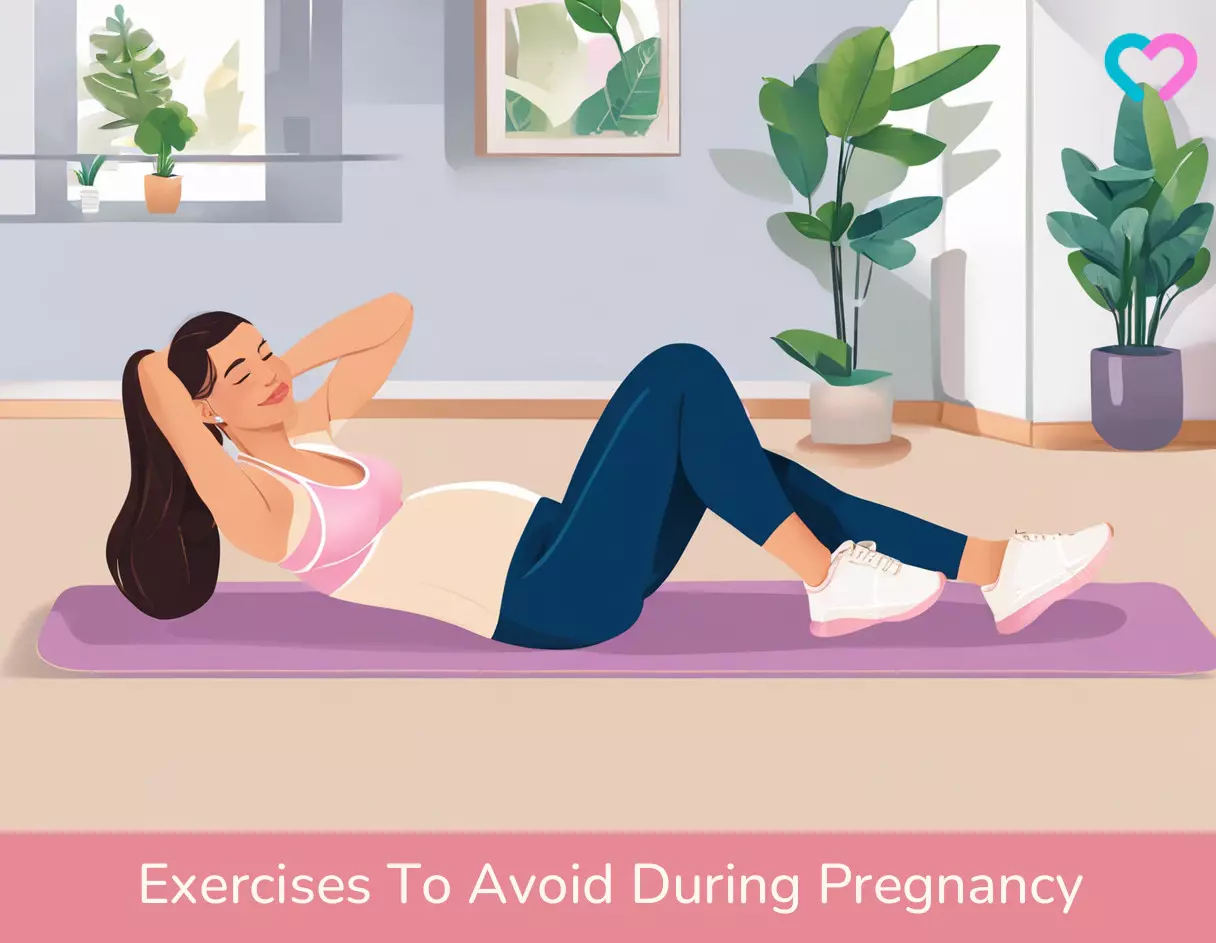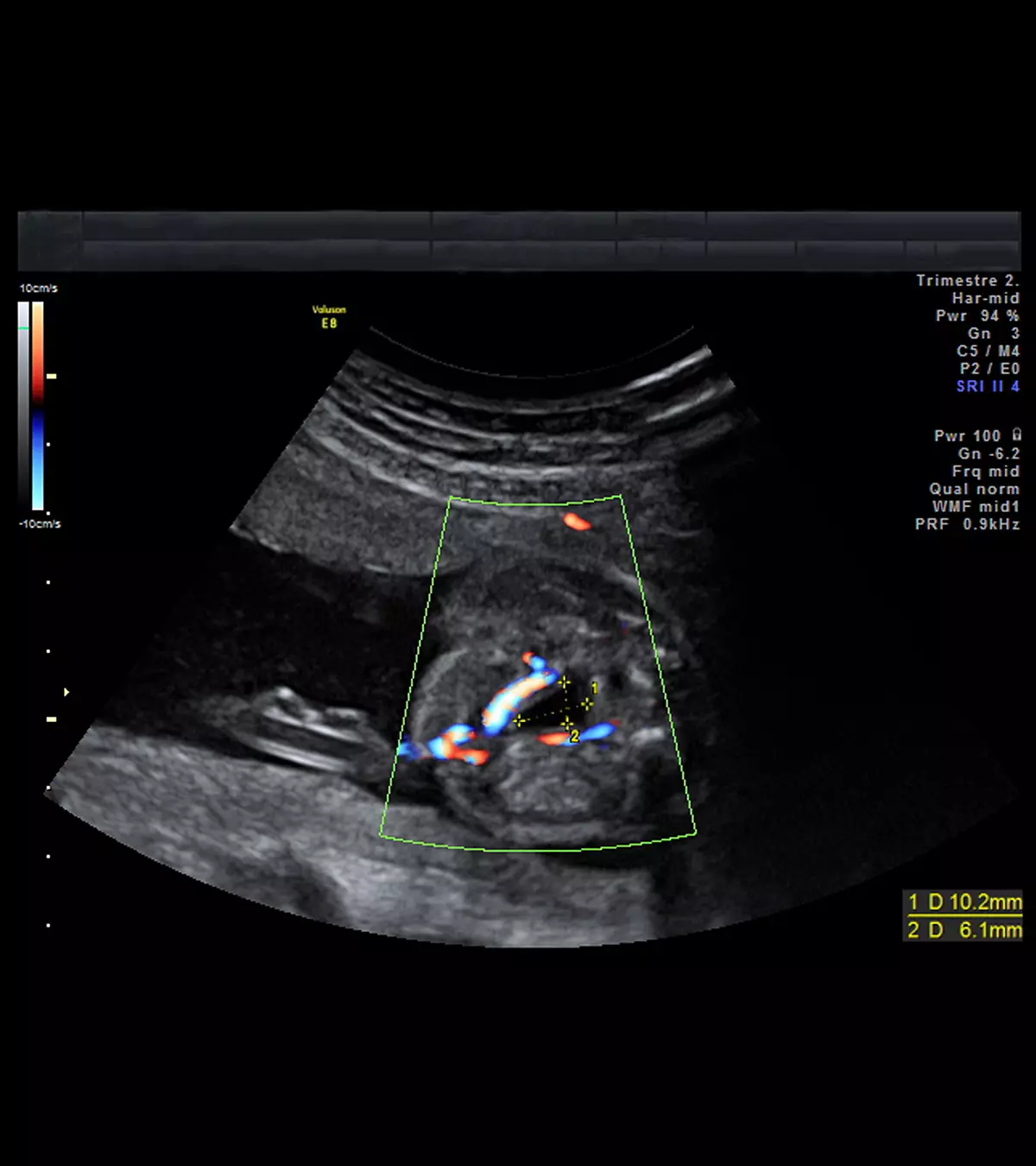
Image: ShutterStock
If you are an expecting mom, you may have been told to work out regularly to stay fit. However, while planning your workout regime, you should know the exercises to avoid during pregnancy. Although exercises help reduce pregnancy discomfort, sleep better, and relieve stress, not all are suitable for pregnant women. Exercises such as crunches, contact sports, or hot yoga may cause complications. Therefore, before exercising during pregnancy, consult your doctor to learn about safe exercises during pregnancy and also some safety tips. This post provides information on the many aspects of exercising during pregnancy, including exercises you should avoid and important tips.

Key Pointers
- Regular exercises can alleviate back pain, boost energy, improve sleep, and manage gestational diabetes.
- Certain exercises may harm during pregnancy due to the risk of injury, overheating, or body imbalance.
- Avoid crunches, sit-ups, HIIT, high-impact sports, hot yoga, weight lifting, and aerobic exercises during pregnancy.
- Stop exercising immediately if you experience headache, rapid heartbeat, chest pain, dizziness, vaginal bleeding, or any pain.
- Always consult your doctor and learn about safety tips before exercising during pregnancy.
Safety Of Exercising During Pregnancy

Yes. Exercising is safe for both the mother and the fetus. In fact, you need to work out regularly during this time, even if you did not have a fitness routine previously. However, consult your doctor before chalking out an exercise regime (1).
Since the body undergoes several physical changes during pregnancy, it is necessary to choose the activities that are in sync with the changes.
 Quick tip
Quick tipPhysical Changes That Affect Exercise During Pregnancy

Your body is not flexible enough to do difficult exercises. The growing tummy and weakening body are an impediment to your schedule. Here is how a few changes can affect you (1):
- The ligaments and joints loosen up due to the pregnancy hormones. The relaxed joints are prone to injuries during exercise.
- A strenuous schedule will increase your heart rate.
- The decrease in blood pressure causes light-headedness and dizziness.
- Your growing tummy alters the body’s center of gravity, making you less stable.
You may note that we are not asking you to abstain from exercising. You need to exercise but engage in activities that are comfortable for you to perform. And when your body sends you a signal that it can’t take it anymore, stop immediately.
When To Stop Exercising During Pregnancy

If your body shows any of the below symptoms, then stop and rest (1):
- Headache
- Rapid heartbeat
- Chest pain
- Dizziness
- Vaginal bleeding
- Shortness of breath
- Weakness in the muscles
- Deep back, pubic or pelvic pain
In addition to physical symptoms, be aware of emotional distress such as anxiety or overwhelming fatigue, which may indicate that it’s time to pause your exercise routine and consult with a healthcare provider. Talk to your doctor if these symptoms persist even after you have stopped doing the physical activities. Also, before you chalk out your exercise plan, you need to know about the activities that SHOULD NOT figure in your list.
Exercises To Avoid During Pregnancy

Let’s see the exercises that are best removed from your daily routine:
1. Crunches or sit-ups
Avoid doing abdominal exercises during pregnancy, such as crunches or sit-ups (2).
2. Overhead shoulder press
This exercise is not good after the first trimester (3). It puts stress on your lower back, which is not good during pregnancy.
3. High-intensity interval workouts
During pregnancy, your heart works hard to meet the increased demand for blood. High-intensity interval workouts increase the heart beat, thereby putting pressure on your heart. Your heart rate should not go beyond 100 beats per minute.
4. Contact or high impact sport
Any high-impact exercise or contact sports should be strictly avoided during pregnancy. Engaging in such sports activities can lead to injuries (1).
5. Lying flat on your back
If you are in the second or third trimester, do not do exercises by lying on your back.
This position can result in supine hypotension syndrome, which is associated with symptoms like low blood pressure and dizziness.
6. Deep sumo squats and sumo deadlifts
Avoid engaging in exercises like deep sumo squats and sumo deadlifts as they can result in injuries and backache.
7. Hot yoga
Hot yoga leads to overheating of the body, which is not good during pregnancy. Avoid exercising in hot and humid conditions as it overheats the body (4). However, you can try other yoga poses that are safe during pregnancy.
8. Weight lifting
Heavy weightlifting exercises are a strict no during pregnancy because they can lead to musculoskeletal stress and cardiovascular issues (5).
9. Scuba diving
Avoid engaging in activities such as scuba diving (1).
10. Aerobic exercises
Although moderate exercises are good, strenuous aerobics should be avoided during pregnancy, especially if you have a heart disease, severe anemia, or persistent bleeding in the second or third trimester.
11. Twisting Movements
Avoid exercises that require twisting at the waist, such as certain yoga poses, as they can stress the abdomen and cause discomfort.
Some other exercises to avoid while pregnant include the ones that involve lying on the stomach, backbends, tai chi, skiing, high-altitude training sports and movements involving the extension of joints.
 Quick tip
Quick tipThe one simple rule: You must feel comfortable while doing an exercise. If you feel uneasy, then stop and take a break. Yes, we say a ‘break’ because you need not stop exercising completely, as it is good for you in more ways than one.
A study at the University of Edinburgh surveyed healthcare professionals and patients on pregnant women’s physical activity. The graph below shows that healthcare experts advise against engaging in certain activities, such as contact sports like rugby (60%) and exercises that can result in trauma (32%). Weight training and high-intensity exercises during pregnancy are other physical activities that are recommended to be avoided.

Exercises to avoid during pregnancy
Source: An Evaluation of Patient and Staff Knowledge of Physical Activity Guidelines During Pregnancy within Dumfries and Galloway Royal Infirmary - Internal audit; Dumfries & Galloway Royal Infirmary/NHSHow Can Exercises Benefit Your Pregnancy?

If you are planning to start exercising or haven’t started exercising yet, then you should read on as we tell you how physical activity can be of immense help to you during pregnancy:
- Reduces discomfort during pregnancy: Regular exercising is important to help strengthen your muscles. Also, it helps your body cope with the pains and other discomforts. Light and safe pregnancy exercises like walking, stretching, and yoga help ease back pain, strengthen your abdominal muscles, and improve blood circulation.
- Boosts your energy levels: Regular exercise enhances your energy level and helps do your daily tasks (6). Working out strengthens your cardiovascular system. With toned muscles, you can have an active lifestyle.
- Makes you sleep better: As your pregnancy proceeds, you may find trouble sleeping through the night. However, engaging in regular physical activities will help you get a sound sleep (7).
- Reduces stress: During pregnancy, hormonal changes bring in mood swings and leave you stressful. A regular exercise routine keeps stress at bay. Moreover, interacting with other pregnant women during your workout sessions could be a great stress-buster.
- Builds your confidence: You would have several doubts about your ability to deliver a baby. You might have fears about your pregnancy and the health of the fetus. Exercise makes you overcome all such emotions as it builds confidence in you.
- Helps prepare for childbirth: Childbirth requires stamina and you can gain this through regular exercises during pregnancy. If you stay in shape, your labor can ease up and the delivery time gets reduced.
- Gestational diabetes (GD): Exercising helps by keeping blood sugar levels in check (1).
- Helps regain pre-pregnancy weight post-delivery: While you are engaged in physical activities, you gain strength, and your muscles get toned. This helps you bounce back to a normal state after childbirth. Moreover, there are few chances of putting on excess weight (1).
Jenn McKee, a mom and fitness enthusiast, attests to the positive impact of exercising during her pregnancy. She says, “I sincerely believed that my exercise regimen (jogging, a weekly yoga class, and occasional light weightlifting) had helped make my pregnancy a breeze, relatively speaking. I never once suffered back pain, or any other pain; I slept well; my weight gain stayed within the normal range; and even at the end, I never got to a point where walking was a burden (i).”
Before you start a fitness regime, you need to know about the safety precautions that should be taken.
Tips For A Good Exercise Regime During Pregnancy
Talk to your doctor, and follow the below tips to have a pleasant workout session:
- In the case of medical issues such as high blood pressure or heart disease, take medical advice before you begin any exercise.
- If you are having any pregnancy related conditions such as low placenta, history of premature birth, a weakened cervix, bleeding and spotting, etc., your doctor may advise you not to exercise at all.
- Try to stick to light physical activities throughout the day without causing any exertion to your body.
- Instead of coming up with your own fitness routine, seek professional guidance for the activities to be effective and safe.
- Do not begin directly with difficult exercises as you could harm your muscles and ligaments. Start with warm-ups. For example, if you are walking, walk slowly for the first few minutes and gradually pick up the pace.
- Drink plenty of fluids before, during, and after exercise to prevent dehydration, especially in warm weather.
 Point to consider
Point to considerFrequently Asked Questions
1. Is it okay to exercise in the first trimester?
Yes, engaging in light aerobic exercises, yoga, and pilates is fine during the first trimester. But it is essential not to overexert the body. Low-intensity weight training is also beneficial during this time. If, at any point, it feels difficult to breathe, stop the exercise, rest, and hydrate. Consult your healthcare provider before doing exercises in the first trimester and learn the precautions appropriate for your pregnancy.
2. Can I perform leg raises while pregnant?
According to studies, traditional leg lifts, in which a person rests flat on the back, may be harmful to maternal health. Leg lifts put pressure on the lower abdomen. It also increases the blood pressure of the pregnant mother. So, avoiding such exercises that involve lying flat on the floor is best (10).
3. Can I flex my abs while pregnant?
Flexing or pulling the abs for long periods prevents the lungs and diaphragm from fully expanding and contracting. Flexing abs is a kind of pelvic floor exercise. This can become more difficult to perform during pregnancy. So, it is wise not to perform it during this time.
4. Can I do planks during pregnancy?
Planks may be fine during the initial weeks of pregnancy; however, they may cause discomfort as the pregnancy advances because the exercise puts pressure on the abdominals. If you have a weak pelvic floor or can feel pressure on the pelvic floor, consult your fitness instructor and ask for a modified workout (11).
Working out during pregnancy is beneficial to you and your baby. Although factors such as loose ligaments and joints along with a growing tummy may cause some discomfort, exercising will help you stay relaxed, sleep better, and prepare for childbirth. However, not all exercises are suitable during pregnancy. Some exercises to avoid during pregnancy may include scuba diving, crunches, deadlifts, and hot yoga. Stick to light physical exercises that do not exert the body, like cycling outdoors or walking. Stop exercising and contact a doctor if you experience headache, chest pain, or dizziness.
Infographic: What Exercises To Not Do During Pregnancy?
Pregnant women need to speak with their healthcare provider before starting any new exercise routine. Your provider can help you determine which activities are safe for you and your baby and can guide you on maintaining a healthy and active lifestyle during pregnancy. Certain exercises should be avoided to protect both the mother and baby. So, refer to the infographic below for a list of exercises to avoid during pregnancy.
Some thing wrong with infographic shortcode. please verify shortcode syntax
Illustration: Exercises To Avoid During Pregnancy

Image: Stable Diffusion/MomJunction Design Team
Exercising during pregnancy is beneficial for both mom and baby. Learn how to stay fit and healthy during this special time with this educational video.
Personal Experience: Source
MomJunction articles include first-hand experiences to provide you with better insights through real-life narratives. Here are the sources of personal accounts referenced in this article.
i. Run, mommy, run! Exercising (and drawing stares) through pregnancy.https://anadequatemom.wordpress.com/2011/03/09/run-mommy-run-exercising-through-pregnancy/
References
- Exercise During Pregnancy.
https://www.acog.org/womens-health/faqs/exercise-during-pregnancy#:~:text=Is%20it%20safe%20to%20exercise - Pregnancy and exercise.
https://www.betterhealth.vic.gov.au/health/healthyliving/pregnancy-and-exercise?viewAsPdf=true - Pregnancy and Fitness.
https://books.google.co.in/books?id=zDeHsuJ8Go0C&pg=PA113&lpg=PA113&dq=Avoid+Overhead+Shoulder+Press+exercises+during+pregnancy+edu&source=bl&ots=YzeRHgKHmj&sig=kiVH5cHzZhmxDPL9gtTUTlC-NSE&hl=en&sa=X&ved=0ahUKEwjXu4z8ieDVAhWDNI8KHcP7DqcQ6AEIlQEwFQ#v=onepage&q&f=false - Justin Chan et al.; (2014); Hot yoga and pregnancy.
https://www.ncbi.nlm.nih.gov/pmc/articles/PMC3994790/ - G Ahlborg Jr et al.; (1990); Heavy lifting during pregnancy–a hazard to the fetus? A prospective study.
https://pubmed.ncbi.nlm.nih.gov/2351529/ - Exercising During Pregnancy.
https://kidshealth.org/en/parents/exercising-pregnancy.html - Sleep During Pregnancy.
https://my.clevelandclinic.org/health/articles/12149-sleep-during-pregnancy - Exercise In Pregnancy.
https://www.nhs.uk/pregnancy/keeping-well/exercise/#:~:text=Keep%20up%20your%20normal%20daily - Danielle B. Cooper And Lily Yang; 2025; Pregnancy And Exercise.
https://www.ncbi.nlm.nih.gov/books/NBK430821/ - Jane Warland; (2017); Back to basics: avoiding the supine position in pregnancy.
https://www.ncbi.nlm.nih.gov/pmc/articles/PMC5309362/ - Exercise modifications during pregnancy.
https://www.pelvicfloorfirst.org.au/pages/exercise-modifications-during-pregnancy.html
Community Experiences
Join the conversation and become a part of our nurturing community! Share your stories, experiences, and insights to connect with fellow parents.
Read full bio of Dr. Anita Gupta
Read full bio of shreeja pillai
Read full bio of Rebecca Malachi
Read full bio of Aneesha Amonz
















